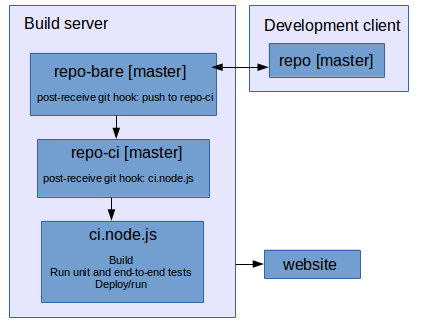Continuous Integration: Difference between revisions
No edit summary |
No edit summary |
||
| Line 55: | Line 55: | ||
* Ubuntu i3 | * Ubuntu i3 | ||
** Use i3 scripting to manage windows placement; see various keyboard shortcuts in config file for examples | ** Use i3 scripting to manage windows placement; see various keyboard shortcuts in config file for examples | ||
[[File:Ci.png]] | [[File:Ci.png]] | ||
* Commit to Continuous Integration with constant automated testing | |||
* apps should have live and test modes, made as similar as possible | |||
* live mode: no tests, lean and mean; usually only one runs at a time in a PROD env (esp for web-driven or service-oriented apps); but you can also debug it in a DEV env | |||
* test mode: always run automated tests on startup, but then function exactly like live mode as much as possible | |||
* test mode: write '''smart''' tests - assert-driven development means we don't need blanket unit-testing on everything - spend time on big domain-specific tests that MATTER | |||
* test mode: multiple simultaneous instances should be allowed, so CI can run on dev box during debugging | |||
* live mode and test mode should be able to run simultaneously, so prod box can always be quickly tested | |||
* dev box needs ci loop that automatically reruns release in test mode on code changes | |||
* NOTE that during initial design/development/refactor of basic architecture, CI has less value and may actually get in the way; better to build a functioning app first. | |||
Revision as of 21:29, 24 March 2016
Terminology:
- Build Type can be: DEBUG, RELEASE
- Run Mode can be: TEST, LIVE
- Environment can be:
| ENVIRONMENT | FOLDER | DESCRIPTION | BUILD TYPE | RUN MODE |
|---|---|---|---|---|
| DEV | myrepo | where code is (mostly) written and tested | DEBUG, RELEASE | TEST, LIVE |
| BARE | myrepo.git | where code is gathered and synced; no visible code | NONE | NONE |
| CI | myrepo-ci | where app is automatically run and tested on any commit | RELEASE | TEST |
| PROD | myrepo-prod | where live app runs available to others | RELEASE | LIVE |
Goals:
- on code save in DEV env: automatically build RELEASE, run TEST
- on code commit: automatically build, do any custom build steps, run any unit tests, run any end-to-end tests, and report results dynamically
- on app production release: compile artifacts, assist in automatic versioning
Tools:
- git
- use a centralized bare repository as the origin target for all the client development environments; master will be the workhorse branch
- git hooks, especially post-receive on the server, which triggers when a new push arrives from any client; this is the entry point for CI server builds
- Node.js
- This allows us to write cross-platform CI scripts in a language that is fundamental to web development
- Base Node.js provides many important cross-platform functions; it is also fundamentally asynchronous
- Use modules and you get command-line support from any path on any platform's shell
- Windows
- window management via AutoHotKey; see various sync ahk scripts for examples
- Powershell; make sure to set it up to get debug output:
$global:DebugPreference = "Continue"
- Ubuntu i3
- Use i3 scripting to manage windows placement; see various keyboard shortcuts in config file for examples
- Commit to Continuous Integration with constant automated testing
- apps should have live and test modes, made as similar as possible
- live mode: no tests, lean and mean; usually only one runs at a time in a PROD env (esp for web-driven or service-oriented apps); but you can also debug it in a DEV env
- test mode: always run automated tests on startup, but then function exactly like live mode as much as possible
- test mode: write smart tests - assert-driven development means we don't need blanket unit-testing on everything - spend time on big domain-specific tests that MATTER
- test mode: multiple simultaneous instances should be allowed, so CI can run on dev box during debugging
- live mode and test mode should be able to run simultaneously, so prod box can always be quickly tested
- dev box needs ci loop that automatically reruns release in test mode on code changes
- NOTE that during initial design/development/refactor of basic architecture, CI has less value and may actually get in the way; better to build a functioning app first.
